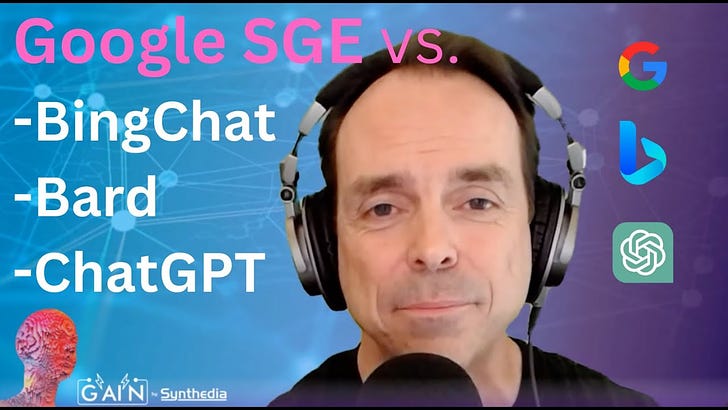Generative AI-enabled search transforms the product output from producing a path for acquiring knowledge to directly sharing knowledge. Instead of receiving sources so they can conduct further research, users receive answers, information, or insight.
It is true that generative AI search engines such as Bing Chat, ChatGPT with Bing, Perplexity, and Google Search Generative Experience (SGE) provide source links for most or all claims stated in a query response. That is very valuable since users may want to conduct additional research and verify the accuracy of the answers and the sources. However, generative AI search is not just more convenient and better for many use cases. It is a fundamentally different value proposition.
Links vs Answers
The primary output of traditional search is source links, which provide access to answers, but typically not the answers. The answers are the user’s primary objective but are not the primary search engine output. Answers are the secondary result of the traditional search output after the user completes the additional task of parsing through information in the source link.
By contrast, the primary output of generative AI-enabled search is answers. The source links are the secondary output, while also enabling access to further information through the sources. This suggests that generative AI-enabled search is better aligned with directly fulfilling user intent.
The primary output of traditional search is source links, which provide access to answers, but typically not the answers...By contrast, the primary output of generative AI-enabled search is answers. The source links are the secondary output…This suggests that generative AI-enabled search is better aligned with directly fulfilling user intent.
Google Search indeed provides Answer boxes (officially known as Featured Snippets) that directly answer questions while providing source links for further investigation. However, a 2022 analysis by STAT of 5.5 million search engine results pages (SERP) found that only 11% include featured snippets. That is 89% fewer answers than generative AI search results.
100% of the time: Generative AI-enabled Search = Direct Answers
11% of the time: Traditional Search = Direct Answers
89% of the time: Traditional Seach = Source Links (i.e., indirect answers, maybe)
There are also other benefits of generative AI-enabled search. The ability to conduct conversational follow-up questions and get exposed to multiple in-context sources for each answer summary offers significant value for some queries. However, the killer app feature is the consistent delivery of robust answers.
This is the threat to traditional search, which is another way of saying the risk Google faces. Some people have told me that users want links, not answers because they want to go directly to the source. This strikes me as an absurd conclusion. Users want answers and access to source links to facilitate verification. Most of us want our intent completely fulfilled in one step as opposed to two steps, which requires additional work on our part.
Hallucinations and Barriers to Adoption
Granted, easy verification of generative AI-enabled search results is a necessary feature. The well-documented generative AI model “hallucinations” could undermine adoption. If users don’t feel they can trust the results, they will avoid changing habits from traditional search. With that said, users may become comfortable with a limited number of errors provided they can easily verify the results. The one-step intent fulfillment is superior as long as it is reliable in most circumstances.
SEO Consulting in Peril?
Ravi Sen, Associate Professor of Information and Operations Management, Texas A&M University, believes that traditional search is not the only industry that faces the risk of obsolescence due to generative AI. In a recent article published in The Conversation, Sen commented:
I believe [generative AI] may destroy the US$68 billion search engine optimization industry that companies like Google helped create.
For the past 25 years or so, websites, news outlets, blogs and many others with a URL that wanted to get attention have used search engine optimization, or SEO, to “convince” search engines to share their content as high as possible in the results they provide to readers. This has helped drive traffic to their sites and has also spawned an industry of consultants and marketers who advise on how best to do that.
…
Over time, as the quality of AI-generated answers improve, users will have less incentive to browse through search result listings. They can save time and effort by reading the AI-generated response to their query.
In other words, it would allow you to bypass all those paid links and costly efforts by websites to improve their SEO scores, rendering them useless.
When users start ignoring the sponsored and editorial result listings, this will have an adverse impact on the revenues of SEO consultants, search engine marketers consultants and, ultimately, the bottom line of search engines themselves.
This is a plausible scenario. Becoming one of the “10 blue links” or organic search results on the first page of Google search (or of the new infinite scroll) will, at some point, no longer be the most impactful strategy. Websites will need to be one of the one-to-six links that the generative AI search result provides as a source for its response. Even then, there is some question about how much traffic will go to those websites.
So, where does this leave SEO consultants? In the near term, I don’t see too much risk. Generative AI search adoption is likely to be gradual and then sudden. It often takes considerable time to shift ingrained user behavior. Until the “tipping point” is reached, optimizing website content strategies for ranking highly on SERP will remain important.
But, what happens after generative AI-enabled search moves past novelty to become a mainstream consumer preference? In the medium term, that will likely lead to SEO consultants shifting their focus to helping their clients optimize content for generative AI search results. This will be an extension of their work in helping clients rank for featured snippets. And it will be more complex because there will be work to optimize for ChatGPT, and maybe Bing and other providers. It may lead to an increase in near-term revenue.
A sharp decline could follow this period in SEO consulting because it will be harder to show results. Today, SEO consultants can help clients identify keywords, show them the SERP results, and help them progress closer to page 1, position 1. That may not be possible with generative AI-enabled search experiences. Most only display the answer, a few links, and some suggested follow-up questions. If your website is not part of the response, there is no way to know if you are making progress from obscurity.
The exception to this will be if Google SGE succeeds in retaining Google’s search dominance and successfully navigates the coming technology shift. Google SGE provides an answer and source links at the top of the results page. Paid and organic links follow this. Those organic links are likely to receive the equivalent of SERP page two traffic (i.e., very low), but there will be a way to see where links rank that are not part of the AI-generated response.
So, if Google’s search market share remains the same after the generative AI shake-out, the SEO consulting business may not change much. That is also true for the SEO software market. The status quo will remain, and Google will have dodged a bullet.
Sen is less sanguine about the prospects for SEO consultants. He told me during an email interview:
A big reason why the SEO approach will not work in case of ML-generated answers is that SEO consultants won’t have access to the ML algorithms that search engines use. Even if they can “guess” the algorithm, the skills and expertise that helped the SEO industry succeed won’t work in case of ML-generated answers. A new crop of consultants may come up, but these consulants will be experts in AI and machine learning, knowledge that current SEO consultants lack.
It is a reasonable hypothesis that SEO for generative search will require more technical skill than is generally resident among industry consultants. One way to plug that gap will be to hire data scientists and ML engineers if they are available. Another approach could be to hire analysts combined with adopting more sophisticated tools than those available today.
However, the SEO software market is at higher risk in either case. The metrics and analytics these companies are built around for traditional search will not easily port over to generative AI. In addition, verifying results will be harder as generative responses will vary more than the general stability of algorithmic search between updates.
This is not to say that generative AI-enabled SEO (or AEO, answer engine optimization) results tracking will not be important. It will.
The challenge will be that SEO software technical debt will make this transition costly and time-consuming. Not all of them will make it. The services companies are not asset-based businesses and should be able to shift their focus more easily. Of course, this proposition carries with it the caveat that the SEO consultancies will need to significantly upgrade their teams’ technical repertoire per Professor Sen’s hypothesis.
The Verdict
We don’t know yet how this will play out. However, the key is Google SGE. If that succeeds because it is an easier transition for most consumers who are receiving an augmented traditional search experience, then SEO will evolve into an SEO-AEO hybrid as opposed to changing outright to AEO. If the new model of generative search becomes the standard, then all bets are off. AEO will become dominant, and every SEO consultancy and software company will face significant change.
What seems clear is that marketers have a dragon to slay when it comes to generative AI-enabled search and AEO. Are they ready?
Let me know what you think in the comments below. How will generative AI change SEO and marketing, and under what circumstances?







Completely agree with this take Brett. My thesis for healthcare is that the current patient behaviour of turning to Google as the source of truth (aka Dr. Google) will be replaced by a conversational gen AI interface, just as traditional search gets disrupted by gen AI search.